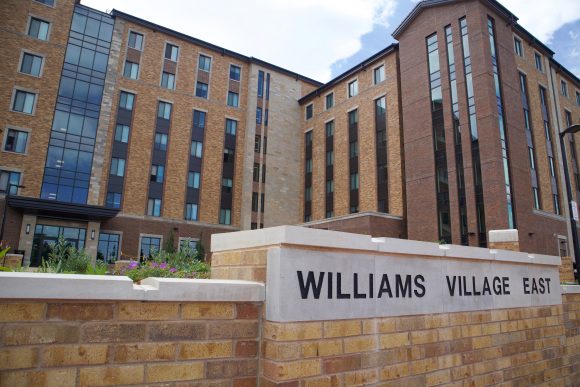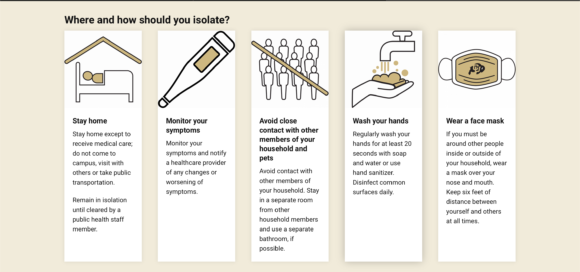
The Williams Village East dorm. Aug. 30, 2019. (Robert Tann/CU Independent)
As COVID-19 cases subside across the country, the University of Colorado Boulder has made some changes to how students should respond if they contract the virus.
Most notably, students who live in university housing are no longer required to wear masks, they aren’t required to get a weekly Covid test and COVID dorms are now a thing of the past. So what do you do if you contract the virus while living in the dorms?
“If I was to test positive right now, I wouldn’t really know what to do or what they (would recommend me) to do,” said Rachel Duffy, a current freshman at the university.
To clear up confusion, Joshua Lindenstein, the acting director and chief spokesperson for CU Boulder, sat down with guest writer Maryjane Glynn for a Q&A session to talk about what students who live on campus should do if they test positive for COVID.
If one of the students (in the dorm) gets Covid, are they required to tell the University?
Anyone with a positive COVID-19 diagnosis via PCR test or positive rapid antigen test should contact Contact Tracing to get information specific to their circumstances.
Contact Tracing’s email is Contacttracing@colorado.edu.
What are the rules students have to follow if they decide to stay in the dorm while having COVID?
The university’s guidance related to isolation and quarantine can be found here: https://www.colorado.edu/health/public-health/quarantine-and-isolation.
Here’s what you need to know from the Health and Wellness Services Webpage:
There is a difference between isolation and quarantine. When you are in isolation, you are not allowed to socialize or leave the place you are isolated until a case investigator releases you. Isolation is for people who have contracted Covid-19 or are experiencing symptoms. Quarantining is for people who have been exposed to Covid-19 but have not tested positive and do not feel symptoms yet.
Anyone who has contracted Covid-19 must quarantine or isolate for five days. Those who feel no symptoms after the five-day period may go back to classes and socialize with a mask on. To ensure the safety of others you should remain wearing your mask for another five days after being released.
Here is how to count your isolation days. The day you feel symptoms or test positive is considered day zero. Let’s say day zero is a Monday. That means you must be isolated or quarantined until Saturday. You may leave quarantine on Sunday.

Isolation Tips Courtesy of CU Boulder Health & Wellness Services.
Here are some possible ways to notify your professors and workplace (if you have a University job) that you have COVID: For those who work on campus you should email leave@colorado.edu. If your symptoms are severe and you need extra support with school or need to make new arrangements for receiving and making up work submit a self-referral form.
What is a student supposed to do if they don’t have access to any COVID tests?
On-campus testing is open to all CU Boulder undergraduate students and graduate students through the Public Health Clinic.
Additionally, rapid antigen tests are available to students for free at the front desk of residence halls and at the various mask distribution sites across campus.
Community testing sites are also available throughout the area.
CU Boulder requires all students and staff members to provide proof of vaccination, including a booster shot. If you have recently gotten your second dose of the vaccine, then you can submit your proof of vaccination five months after receiving your last shot.
Students who plan on not getting the Booster must fill out an exemption form explaining either their medical, ethical or moral reasonings. Students who already have an exemption submitted do not need to submit another one.
As of Mar. 7, CU Boulder no longer requires a mask-mandated policy, except for going to the Wardenburg Health Center. With that being said, it’s up to the students’ preference to decide whether to continue wearing a mask or not.
Duffy stays optimistic about this new change and only plans on wearing her mask in class if she feels ill.
“It’s really nice being able to go anywhere you want not having to remember a mask,” said Duffy. “It did seem kind of sudden…but it’s a good time to start trying to adjust back to normal.”
Contact CU Independent Guest Writer Maryjane Glynn at Maryjane.Glynn@colorado.edu.
